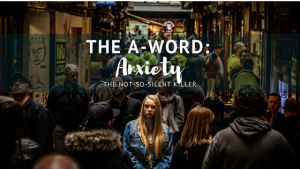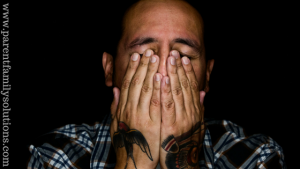
“What’re you so anxious about?!”
“Just think happy thoughts”
Riiiiight!
Just about everybody struggles with anxiety in some form or another.
This is going to be a multiple part series on anxiety in its different forms and coping skills for dealing with yours.
This post I’ll unpack the basics of what anxiety is and give a tip or two for dealing with it.
Mental Health and Psychology go through shifts and changes just like everything else. Every couple of years there seems to be a major shift in response to trends in diagnoses. ADHD was the big one for the 90s. Autism and Asperger’s (All now covered under Autism Spectrum Disorder) came on huge in the early 2000s. Childhood Bipolar saw a huge increase in diagnosis, so much so that they created a more accurate diagnosis in the DSM-5 to counteract it – Disruptive Mood Dysregulation Disorder (DMDD for short).
The strange thing about anxiety is that it’s one of the original diagnoses. And yet, it’s come on with a vengeance over the years. All of the colleagues that I’ve spoken with noted that anxiety-related issues are the number one concern that bring people to counseling.
Anxiety is an insidious beast that comes in many forms. It’s a shape-shifter. And the nastiest part about anxiety is that it is similar to an auto-immune disease where our body starts attacking itself. Except with anxiety, your mind leads the attack.

With anxiety, your mind leads the attack
For some it’s social anxiety. For many it’s more generalized. Others have specific phobias. For an unfortunate number it’s connected to trauma.
One of the issues I always tell the clients I work with is there’s never a break. There’s no ref in your head sounding the bell for the end of the fight. There’s no point where your mind says, “OK. That’s enough beating myself up.”
And you’re your own worst enemy. You know all your insecurities. All your past.
So what is anxiety really?
DSM-5
According to the DSM-5 the criteria for Generalized Anxiety are as follows:
A. Excessive anxiety and worry (apprehensive expectation), occurring more days than not for at least
6 months, about a number of events or activities (such as work or school performance).
B. The individual finds it difficult to control the worry.
C. The anxiety and worry are associated with three (or more) of the following six symptoms (with at least
some symptoms having been present for more days than not for the past 6 months):
Note: Only one item required in children.
1. Restlessness, feeling keyed up or on edge.
2. Being easily fatigued.
3. Difficulty concentrating or mind going blank.
4. Irritability.
5. Muscle tension.
6. Sleep disturbance (difficulty falling or staying asleep, or restless, unsatisfying sleep).
D. The anxiety, worry, or physical symptoms cause clinically significant distress or impairment in social, occupational, or other important areas of functioning.
E. The disturbance is not attributable to the physiological effects of a substance (e.g., a drug of abuse, a medication) or another medical condition (e.g., hyperthyroidism).
F. The disturbance is not better explained by another medical disorder (e.g., anxiety or worry about
having panic attacks in panic disorder, negative evaluation in social anxiety disorder [social phobia],
contamination or other obsessions in obsessive-compulsive disorder, separation from attachment
figures in separation anxiety disorder, reminders of traumatic events in posttraumatic stress disorder,
gaining weight in anorexia nervosa, physical complaints in somatic symptom disorder, perceived
appearance flaws in body dysmorphic disorder, having a serious illness in illness anxiety disorder,
or the content of delusional beliefs in schizophrenia or delusional disorder). (American Psychiatric Association – DSM 5)
Physiologically
In our bodies it’s a state brought on by a threat to our well-being or survival (whether it’s a real or imagined threat). “It is characterized by increased arousal, expectancy, autonomic and neuroendocrine activation, and specific behavior patterns. The function of these changes is to facilitate coping with an adverse or unexpected situation. Pathological anxiety interferes with the ability to cope successfully with life challenges.” (National Center for Biotechnology Information)

Anxiety effects us physically and emotionally
And that’s the key right there.
The anticipation!
See our brains and our bodies are extremely complex. They are designed to protect us from harm.
But it’s a bit of a fool’s errand.
Bad things happen! It’s unavoidable.
And when bad things have happened once, our brain and body go on high alert looking for them to happen again. Sometimes with good cause…sometimes without.
And that’s what really gets us. What if?
The “What if?!”
The “What if?” thoughts are one of the biggest issues to overcome.
Like the deafening, metallic thunder of a smoking Gatling gun that never runs out of a string of cutting, surgically-precise mental bullets aimed at your own self-esteem and insecurities…our anxiety marches on unchecked.

“What if?” thoughts can be relentless
What if I don’t touch the doorknob 3x? What bad things could happen then?
What if I get up on stage and everyone laughs at me?
What if everyone can tell how anxious I am?
What if nobody likes me?
Unless
Unless you take a stand!
In the world of anxiety, anything that you avoid is gonna get worse. Anything that you face is going to get better. But, I will note that immersion therapy techniques like Fear Factor-esque, “here, let’s put you in a coffin full of spiders to get you over your fear of spiders” doesn’t work! Systematic desensitization or Exposure Response Prevention (ERP) with planning and use of relaxation techniques coupled with Cognitive Behavioral Therapy (CBT) works extremely well.
Here are 2 things you can put into use today that will help.
-

Writing your thoughts down can be a huge help
Write the anxious thoughts down – Journaling may be the cliche therapeutic technique; but, it gets recommended so much because it works. With anxious thoughts, they dominate your thinking and rob you of your ability to focus and make decisions. Writing them down helps you to see: A. There aren’t as many negative, anxious thoughts as it feels like swirling around in your brain. B. There is a way to combat those anxious thoughts.

Have a plan for dealing with your anxiety
2. Develop an anxiety plan – When you get triggered, what are the healthy coping skills that work for you? How do you create some space between you and the anxiety? Do you go for a run? Do you take a bath or shower? Do you talk to someone in your life that you trust to listen to you? Put that plan into writing. Again, writing helps!
I’ll be covering many more tips in greater detail in a future post as well.
What kind of anxiety are you plagued with?
What topics about anxiety would you like me to cover in this series?
What things work for you to overcome your anxiety?
Next post: The Voice In Your Head – Cognitive Distortions (Stinking Thinking)

Most I know have anxiety about future events. For some reason, I think of past actions from years ago or recently & get anxiety. Why did I do that? Why did I say that? What did they think of me? I also have bipolar disorder 2.
LikeLiked by 1 person
Thanks for reading and sharing Casey! For some this is where DBT Dialectical Behavior Therapy can come in handy. So many of us struggle to be present in the moment and are constantly looking behind or ahead
LikeLiked by 1 person
Great post! Anxiety is a very prevelant problem .
LikeLiked by 1 person
Thanks for the kind words! Definitely a huge problem
LikeLike
Good post thanks
LikeLiked by 1 person
Thanks so much for taking the time to read Kelly
LikeLike
Thanks for taking the time to write it, cheers. I’ll check back again
LikeLiked by 1 person
Anxiety a boon or a burden?
LikeLiked by 1 person
Great question! There’s a lot to be said for good stress and how it can motivate us. Sometimes I fear that our society has become obsessed with happiness yet lost the definition for what that is and what a realistic expectation for how life should be. Thanks for reading and commenting
LikeLike
An important topic, John. The more conversation the better.
Downunder I’ve noticed a similar increase that doesn’t just seem to be accounted for by diagnostic bias or Big Pharma manipulation. I think we live in anxious times and it does not seem to be getting any better. Quite the reverse.
One important aspect — discussed far less than I believe is warranted — is the correlation between trauma and anxiety. It may be outside the scope of your planned series, but I hope you don’t mind my mentioning it. People can often feel failures when ‘standard’ approaches or interventions don’t have any impact. But if trauma (recent or long past) is involved, then finding a trustworthy professional to work with is worth considering. It’s not quick but it can help.
All the best
Bruce
LikeLiked by 1 person
Thanks so much for your input Bruce! I definitely agree. I find myself aligning more and more with Bessel van der Kolk’s views on trauma and wish his Developmental Trauma Disorder had been approved for inclusion in the DSM 5. Trauma completely changes the way our brains respond to the world around us. And sadly, too few grasp how significant life experiences can be and don’t recognize trauma when it has happened. Thanks again for the insightful feedback!
LikeLiked by 1 person
Full agreement John.
LikeLike
Thanks for your excellent article on anxiety. I am looking forward to reading the series. I have faced anxiety all my life. With a lot of personal work, I am much better. I have found the Enneagram Personality modality very helpful in my recovery. Right now we are facing a plague of anxiety in the world caused by so much distraction and fear.
LikeLiked by 1 person
I agree. I’d say it’s a widespread issue. The Enneagram can definitely be helpful. Thanks for sharing your struggle!
LikeLike
Reblogged this on Roland Legge and commented:
So many of us face anxiety. Check out this excellent article on how to deal with anxiety.
LikeLiked by 1 person
Thanks so much Roland!
LikeLike
Thanks so much for reblogging the post and for the kind words!
LikeLike
Anxiety MAY be relieved by gradually taking back mental control of one’s own life, from the external forces to which one has, consciously or subconsciously, given control over one’s life. That also is contingent upon one’s own self-trust.
LikeLiked by 1 person
Well said. That last part is usually the kicker though. The inability to reassure yourself. Thanks for reading the post and commenting
LikeLiked by 1 person
Omg, I hear people saying the first part of this post all the time!
LikeLiked by 1 person
Yeah, it’d be nice if it worked that way. 😃
LikeLike
It certainly would be…
LikeLiked by 1 person
This is a wonderfully detailed and well researched post on social anxiety. Thought provoking.
LikeLiked by 1 person
Thanks for the kind words! Hope it helps
LikeLike